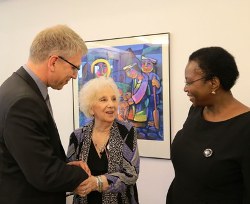
Contact: Media Office, World Council of Churches, +41 79 507 6363
GENEVE, Sept. 1, 2017 /Christian Newswire/ -- "Since 1983 Argentina is enjoying the longest period of democracy in our history – it is a great achievement and that is why we need to take care of it." Pride in the peaceful change from military dictatorship to democracy 35 years ago and concern over recent developments in her country was the message that Estela Barnes de Carlotto brought with her to a meeting in Geneva reinvigorating the friendship between the World Council of Churches (WCC) and the Association of the Grandmothers of the Plaza de Mayo, of which she is the president.
Photo: WCC general secretary Tveit, Estela de Carlotto and deputy general secretary Isabel Apawo Phiri.
Carlotto was welcomed to the Ecumenical Centre in Geneva, by WCC general secretary Rev. Dr Olav Fykse Tveit and senior staff members. She thanked the WCC for the support received during the years when she and other women started their weekly demonstrations in Plaza de Mayo. They had chosen this symbolic square in the centre of the Argentinian capital to demand justice for their children who had been abducted, as well as the restitution of their grandchildren born in the regime's secret detention centres.
"Through our pain, we decided to be united," Carlotto said, recalling the collective strength of these mothers and grandmothers.
The vigour and dedication of the 86-year-old impressed the WCC staff no less than the moving story she had to tell of her family's suffering. First, in 1977, her husband was kidnapped and detained for 25 days because the regime wanted to know where the couple's daughters – members of a student movement – were. Having witnessed and experienced torture during these 25 days, he was eventually freed.
The family was not so lucky when, a few months later, their daughter Laura, pregnant at the time, was also illegally arrested. Though she was not killed right away like her partner, her life was only spared until she gave birth to a boy, as the family would learn much later.
Unlike the families of other disappeared, "we had the privilege to receive her body the day she was killed," Carlotto recalled, and explained how her pain transformed into a commitment: "I promised at my daughter's grave that I would seek justice for her and find her son."
In 2014, Carlotto was indeed reunited with her grandson Guido, when he responded to the public invitation from the Grandmothers of the Plaza de Mayo for young people with doubts about their identity to go for DNA testing. The joy of finding her long-lost grandchild has not weakened her commitment: "I will keep working for the grandmothers whose arms are still empty for as long as I have life and health," she says.
The grandmothers' association continues its commitment to the 30,000 who were abducted between 1976-83, by seeking justice through the legal system and collecting forensic evidence. It also continues its efforts to reunite with their biological families the estimated 500 children who were illegally and secretly adopted during that time, sometimes by the murderers of the real parents. So far, 122 children have been able to find their true identity with the help of the grandmothers.
At the meeting with WCC officials, Carlotto expressed concern that nowadays, especially since the election of a new government in 2015, the space for debate over the crimes of the past is shrinking.
Carlotto also spoke about the case of Santiago Maldonado, a 28-year-old who has been missing since 1 August after participating in an indigenous-rights demonstration in Patagonia. She joined the concerns expressed by the young man's family that the state is not taking seriously indications pointing to the security forces' involvement in his disappearance. Solidarity demonstrations throughout Argentina have been announced for 1 September.
WCC member churches in Argentina
Read also:
Argentinean churches rejoice at grandmother finding grandson born to death camp mother (WCC press release of August 2014)
Statements regarding the disappearance of Santiago Maldonado by the Ecumenical Movement for Human Rights (MEDH), the Evangelical Church of the River Plate, the United Evangelical Lutheran Church, the Evangelical Methodist Church of Argentina, and the Waldensian Church (in Spanish)
Photos of the meeting and a 1 minute sound-bite in Spanish available for download free of charge to illustrate this article.
The World Council of Churches promotes Christian unity in faith, witness and service for a just and peaceful world. An ecumenical fellowship of churches founded in 1948, today the WCC brings together 348 Protestant, Orthodox, Anglican and other churches representing more than 550 million Christians in over 120 countries, and works cooperatively with the Roman Catholic Church. The WCC general secretary is the Rev. Dr Olav Fykse Tveit, from the [Lutheran] Church of Norway.

